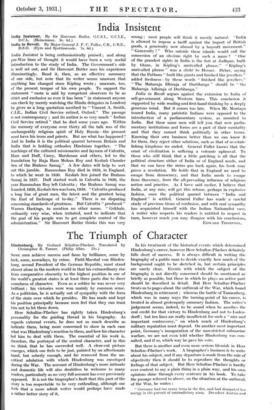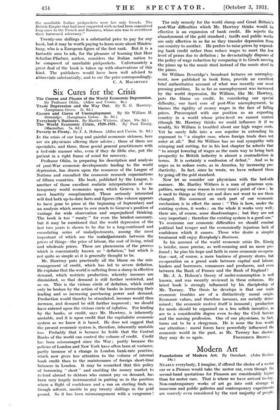The Triumph of Character
Hindenburg. By Gerhard Schultze-Pfaelzer. Translated by Christopher R. Turner. (Philip Allan. 21s.) SOME men achieve success and fame by brilliance, some by luck, some, nowadays, by crime. Field-Marshal von Hinden- burg, second President of the German Republic, must stand almost alone in the modern world in that his extraordinary rise from comparative obscurity to the highest position in one of the world's greatest states is at least three parts due to sheer soundness of. character. Even as a soldier he was never very brilliant ; his victories were won mainly by common sense. As a politician, he is actually out of sympathy with the form of the state over which he presides. He has made and kept his position principally because men feel that they can trust him not to let them down.
Herr Schultze-Pfaelzer has rightly taken Hindenburg's personality for the guiding thread in his biography. As regards external events, he does not so much describe as indicate them, being more concerned to show in each case what was Hindenburg's reaction to them, and how his character led him to deal with them. The essential of his work is, therefore, the portrayal of the central character, and in this we think that he has succeeded well. A clear-cut picture emerges, which one feels to be just, painted by an affectionate hand, but soberly enough, and far removed from the un- critical adulation with which Hindenburg was enveloped during the War. The account of Hindenburg's more intimate and domestic life will also doubtless be welcome to many readers, particularly as no very full account has ever previously appeared. It is not the biographer's fault that this part of the story is too respectable to .he very enthralling, although one feels that a more adroit writer would perhaps have made a rather better story of it. In his treatment of the historical events which determined Ilindenburg's career, however Herr Schultze-Pfaelz,er definitely falls short of success. It is always difficult in writing the biography of a public man to decide exactly how much of the background ought to be sketched in, but certain principles are surely clear. Events with which the subject of the biography is not directly concerned should be mentioned as briefly as possible, but those in which he plays an active part should be described in detail. But Herr Schultze-Pfaelzer treats us to pages about the outbreak of the War, which found Hindenburg in retirement ; whereas the battle of Tannenberg, which was in many ways the turning-point of his career, is treated in almost grotesquely summary fashion. The writer's judgement seems, indeed, to be sound when he ascribes the real credit for that victory to Hindenburg and not to Luden- dorff ; but ten lines are really insufficient for such a " nice and important controversy," on which much of Hindenburg's military reputation must depend. On another most important point, Germany's inauguration of the unrestricted submarine warfare, we are not even told whether Hindenburg was con- sulted, and if so, which way he gave his vote.
But there is another and even more serious blemish in Herr Schultze-Pfaelzer's work. A biographer's business is to write about his subject, and if any departure is made from the rule of objectivity then it should be to reproduce the thoughts or feelings of that subject. But Herr Schultze-Pfaelzer is hardly ever content to say a plain thing in a plain way, and his own opinions shine through every sentence in his book. To take the passage referred to above, on the situation at the outbreak of the War, he writes : " Germany had too many irons in the fire, and had dissipated her energy in the pursuit of contradictory aims. Decadent Austria anJ the unreliable Italian pickpockets wore her only friends. The British Empire that had once coquetted with us had been committed long since to the French and Russians, whose aim was to overthrow their harnessed adversary."
Twenty-one shillings is a substantial price to pay for any book, but it may be worth paying to learn more about Hinden- burg, who is a European figure of the first rank. But it is a fantastic sum to ask, for the pleasure of learning that Herr Schultze-Pfaelzer, author, considers the Italian nation to be composed of unreliable pickpockets. Unfortunately a great deal of the book is taken up with observations of this kind. The publishers would have been well advised to abbreviate substantially, and to cut the price correspondingly.
C. A. MACARTNEY











































 Previous page
Previous page